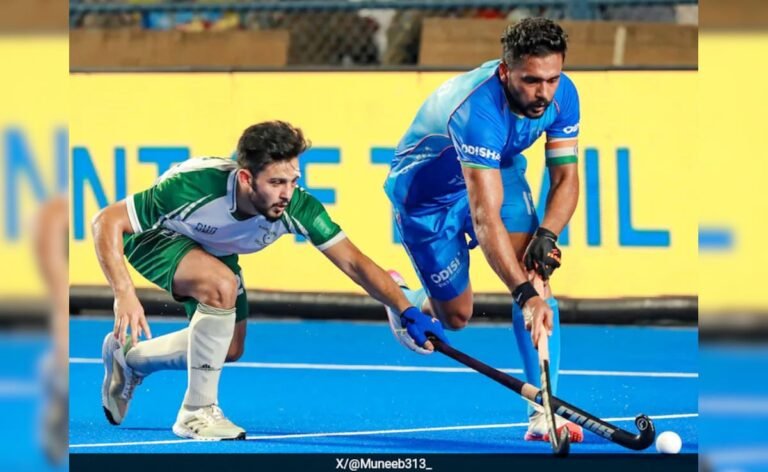Pakistan Government Unlikely to Clear Hockey Teams’ Travel to India for Asia Cup, Junior World Cup: Growing Tensions Put Participation in Doubt…read more…
In a development that could deal a significant blow to international field hockey, reports have emerged that the Pakistan government is unlikely to grant travel clearance to its national and junior men’s hockey teams for two major upcoming tournaments in India — the Men’s Hockey Asia Cup and the Junior World Cup. The decision, still under review, stems from heightened political tensions and serious security concerns following recent cross-border incidents.
According to sources close to Pakistan’s Ministry of Inter-Provincial Coordination (IPC), the body overseeing sports affairs in the country, the clearance process for international tours has effectively stalled. Officials reportedly advised the Pakistan Hockey Federation (PHF) to prepare for the possibility of not participating in either the 2025 Men’s Hockey Asia Cup, scheduled from August 27 to September 7 in Rajgir, Bihar, or the Junior World Cup, set to be held from November 28 to December 10 in Chennai and Madurai.
Security Concerns at the Forefront
The reluctance follows renewed cross-border hostilities after the Pahalgam terror attack earlier this year, which claimed the lives of several Indian civilians and prompted India to launch “Operation Sindoor” — a high-profile counter-terror operation. The political fallout has been swift, and sporting exchanges between the two nuclear-armed neighbors have once again come under intense scrutiny.
Senior officials in Islamabad have voiced concerns that sending Pakistani athletes to India amid rising nationalistic sentiments could pose serious security risks. “No final decision has been taken yet,” said an IPC official who spoke on the condition of anonymity, “but the prevailing sentiment is that the safety of our players cannot be guaranteed, especially in light of recent developments.”
PHF Looks to International Bodies
The Pakistan Hockey Federation has been vocal in its opposition to the potential boycott. With both tournaments carrying Olympic qualification implications and immense exposure opportunities for younger players, PHF officials are reportedly exploring legal and diplomatic options, including approaching the Asian Hockey Federation (AHF) and the International Hockey Federation (FIH) to either secure safety guarantees or request a change in venue.
Speaking to reporters in Lahore, PHF Secretary Haider Hussain expressed disappointment at the situation: “This is an unfortunate moment for hockey. Our athletes have trained tirelessly for these events, and to be denied participation due to politics is heartbreaking. We are engaging with the appropriate authorities, and we remain hopeful.”
However, analysts suggest the prospects of relocating either tournament are slim. India remains a central hub for global hockey events due to its infrastructure and commercial viability. Both AHF and FIH have thus far maintained silence on the issue, though sources suggest they are closely monitoring the situation.
India Maintains It’s Business as Usual
On the Indian side, Hockey India has reiterated that the government has no objection to Pakistan’s participation, provided all standard protocols are followed. “Our position is clear — we will abide by whatever direction is given to us by the Government of India,” said a senior Hockey India official. “We welcome all teams, including Pakistan, under the umbrella of sportsmanship and fair play.”
Indian Home Ministry officials added that if the PHF formally requests security assistance, the Indian government would evaluate it on a case-by-case basis. In previous years, Pakistan’s teams have participated in Indian-hosted events with police and paramilitary escorts, though not without controversy and protests.
A Familiar Pattern
This isn’t the first time politics has interfered with Indo-Pak sporting relations. Cricket ties between the two countries have been frozen since 2012, with only ICC-sanctioned events seeing both nations share a field. The hockey world, despite being less commercially explosive than cricket, hasn’t been spared either.
Pakistan previously missed the 2016 Junior Hockey World Cup held in India after being denied visas, a decision that sparked diplomatic outcry. In return, Indian athletes have occasionally been blocked from participating in tournaments hosted in Pakistan. The latest development appears to be a continuation of that tit-for-tat history.
Sporting Community Reacts
The hockey community worldwide has reacted with disappointment to the news. Several former players and coaches from both nations have called for the depoliticization of sport, emphasizing that athletes should not be punished for government decisions.
Former Indian captain Sardar Singh said, “It’s disheartening if Pakistan can’t come. Rivalry aside, our matches are always competitive and showcase the spirit of the game. Losing that due to politics is a tragedy for the sport.”
Meanwhile, Shahbaz Ahmed, former PHF Secretary and legendary Pakistani midfielder, added: “If our boys don’t get to play, we are setting a dangerous precedent. Sport should heal divides, not deepen them.”
What Happens Next?
While the final decision is expected in the coming days, insiders suggest the writing is already on the wall. Without a formal clearance from the IPC, Pakistan’s hockey teams will be unable to apply for Indian visas. Even if that obstacle is cleared, there remains the possibility of diplomatic resistance or additional hurdles from either side’s foreign ministries.
If Pakistan does withdraw, the AHF and FIH may face calls to penalize the nation for non-participation. However, they will likely avoid such action if the reasons are grounded in documented security concerns.
In the meantime, PHF continues to hold training camps and is urging players to stay focused despite the uncertainty. “We owe it to the players to keep hope alive,” said head coach Hanif Khan. “Until there is an official notification, we will prepare as if we are going.”
Conclusion
As political tensions bleed into the sports arena once again, the fate of Pakistan’s hockey teams hangs in the balance. The decision, when it comes, will resonate far beyond the field, serving as a potent reminder that in South Asia, sport and politics often walk hand-in-hand — not always to the benefit of athletes or fans.
Whether through diplomacy, pressure from global hockey bodies, or a last-minute reprieve, the hope remains that sport ca
n prevail. But with each passing day, that hope dims.



